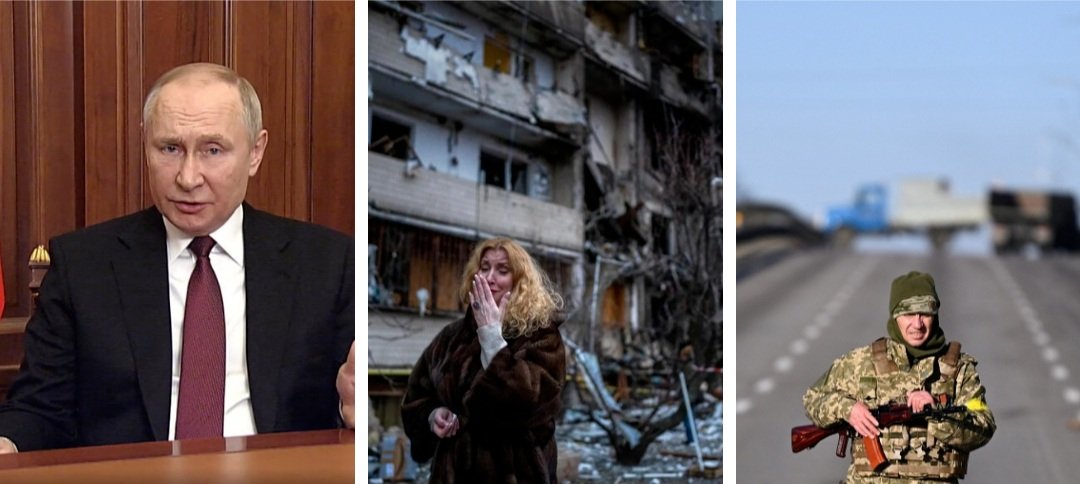Consequences of the Russian Invasion

On March 2, tensions between Russia and Ukraine escalated as Russian strikes targeted schools and places of public gathering in Ukraine’s second-largest city, Kharkiv. The Ukrainian city of Kherson was confirmed to have fallen under Russian control.
At an emergency United Nations General Assembly (UNGA) vote to condemn the Russian invasion, a number of countries allied with Russia abstained from the vote, going against a majority agreement among the international community that Russia has acted illegally. The International Criminal Court in the Hague confirmed that it would proceed with an investigation of war crimes committed by Russia, including incidents from 2013 and onwards.
This educational program was organized by the Association of Foreign Press Correspondents in the USA (AFPC-USA) on Wednesday 2 March at 8 PM EST, examining the short and long-term consequences of the Russian invasion of Ukraine.
Global Security Institute President Jonathan Granoff and chief US correspondent for the Ukrainian Inter TV channel Dmitry Anopchenko joined the Association of Foreign Press Correspondents’ Grant Schreiber for an educational program highlighting the importance of the press and legal advocacy in times of high international tensions.
Anopchenko, who has worked as a journalist in Ukraine since the age of 19, gave a unique perspective of the escalating crisis through a Ukrainian reporter’s eyes. Granoff offered insights addressing issues calling for greater press attention in the Russian invasion of Ukraine that gives sensitivity to the humanitarian costs and how establishing and advocating for an improved international legal system is critical to avoiding such future conflicts.
Violations of International Legal Agreements
“This is a pure act of illegal, immoral aggression against an innocent neighbor,” said Granoff. Criticizing the Russian threat of nuclear arms usage, Granoff went on to describe the implications of nuclear war and its threat to modern civilization. “The legal aspect of it is that there’s a treaty, the Nuclear Non-Proliferation Treaty, which I believe is the third-most important legal instrument of the 20th century, the most important legal instrument being the United Nations Charter and the second being the Universal Declaration of Human Rights.”
On the violation of the Nuclear Non-Proliferation Treaty, which commits the nuclear weapons states to pursue the elimination of nuclear weapons, Granoff urges the international press to “highlight this affront to that important fabric of global security.”
A Ukrainian Perspective of Press Involvement
Anopchenko, based in Washington D.C., spoke on the difficulties of separating the personal from professional while having family in Kyiv and covering the US State Department’s reactions to the conflict. “As [a] journalist, I’m trying to gather the information but unfortunately even speaking off-record with a lot of speakers, a lot of newsmakers, I don’t see the clear understanding in their eyes – in their thoughts – of what will happen next.”
What Are the Consequences of Conflict and Who Will Be Held Accountable?
Schreiber emphasized the human and economic impacts of Russian aggression, especially focusing on the consequences of the 500,000 people (now estimated by the UN to be 1 million) who have fled Ukraine since the onset of the invasion. Granoff and Anopchenko spoke with uncertainty regarding what the actual outcomes of the Russian invasion entails, mentioning countries that abstained from the UNGA vote.
“What will happen if we keep Russia from the UN Security Council? There is no clear answer of what will happen next. We may destroy this whole system which has worked but we will not stop this invasion,” said Anopchenko. Recognizing that Ukraine will continue to face difficulties, he remained confident in American and international solidarity efforts with Ukraine.
The Responsibilities of Journalists to the International Community
Anopchenko spoke about how the increased presence of reporting from Ukraine could discourage further invasion of Russian forces. He suggests that while journalism itself may not stop the Russian invasion, upping the coverage and reporting on an international scale will make it more costly for President Vladimir Putin to move forward.
Granoff urged journalists to find ways to inform Russian citizens of Putin’s violations of international law.
“It’s important that journalists not be cynical, there’s a pandemic of cynicism in the journalism community. We need a vaccination of vision, a vaccination of hope, a vaccination of our common humanity,” he emphasized in comments on the important role of journalists going forward.
Kate Nakamura is a news associate of the Foreign Press. She was born and raised in Honolulu, Hawaii, and moved to New York City to study journalism at Hunter College. She graduated in 2020 with a Bachelor's degree in Media Studies, focusing primarily on documentary filmmaking and multimedia journalism. Her primary focus in journalism is writing and reporting on minority issues in the United States.

